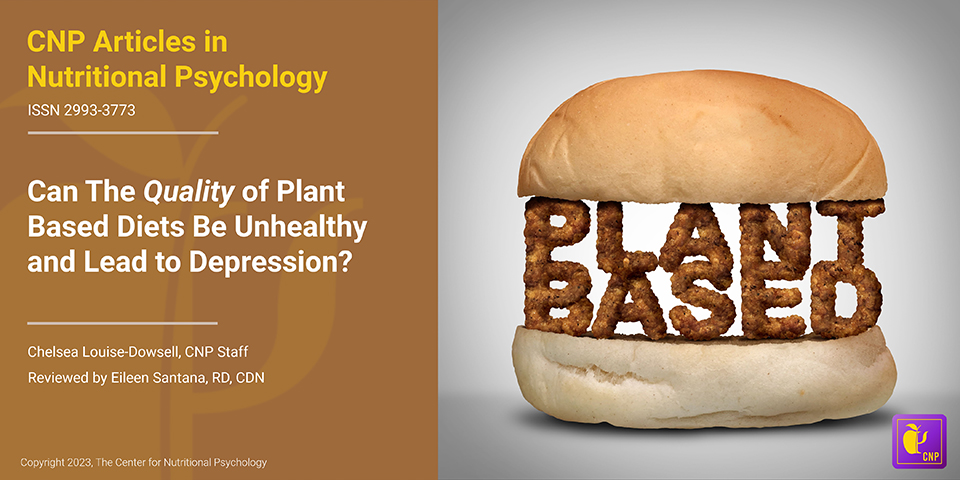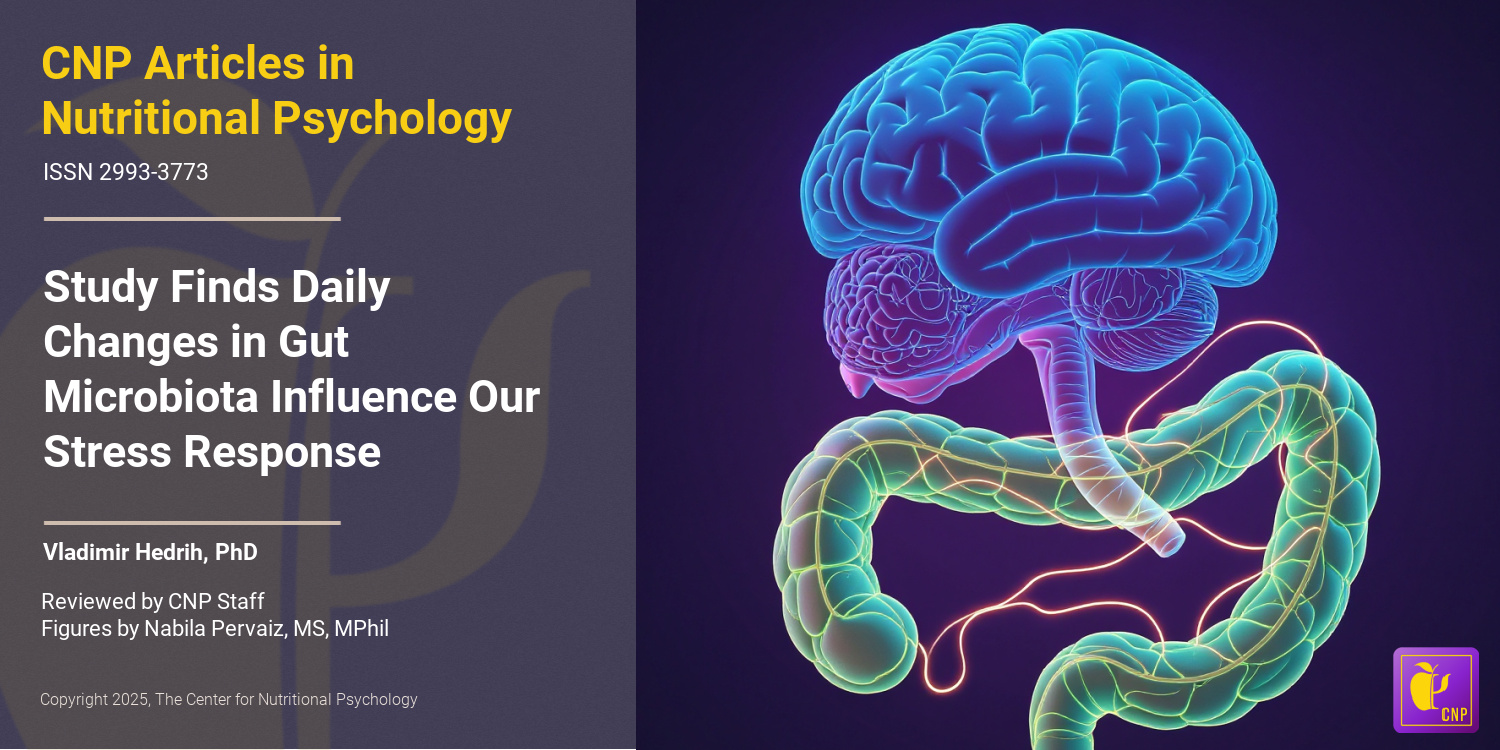This CNP Article is based on the findings from a recent study conducted by Lee, Eather, & Best, (2021).
The consumption of plant-based diets and the rate of depression have both risen within the last decade. While some studies have shown vegan and vegetarian diets to be conducive to mental health problems (e.g., Li et al., 2019), others claim that those who follow a plant-based diet experience higher levels of emotional health and well-being (Beezhold & Johnston, 2012). Still, others suggest that there is no relation (Lavallee, 2019).
Could the lack of conversation around diet quality be cause for conflicting research?
Basically, the evidence on the relationship between plant-based dietary patterns and depression is inconsistent and conflicting. One possible explanation for this could be the lack of conversation around diet quality within the realm of plant-based diets. When we think of vegan and vegetarian diets, our brains may automatically conjure up images of health and vitality. And while such diets are associated with decreased risk of obesity, cardiovascular disease, type II diabetes, and other serious health issues, it’s important to discuss the different possible types of plant-based diets (Lee et al., 2021).
A healthy plant-based dietary pattern is defined by a high intake of fruit, vegetables, nuts, seeds, legumes, whole grains, tofu, tempeh, and other minimally processed soy products. An unhealthy plant-based diet, on the other hand, would be characterized by high consumption of ultra-processed foods, high in fat and refined sugars. While decidedly low in nutrition, such diets can be vegetarian or vegan. You might know someone who falls into this trap — the friend who finds comfort in their decision to eat plant-based, only to consume french fries, donuts, highly processed plant-based meats, and other processed treats habitually.

Noticing the inconsistency within current research when looking at plant-based diets and depression, researchers Lee et al. (2021) took to Facebook, Twitter, and Linkedin to survey the quality of vegans’ and vegetarians’ plant-based diets and their mental health. Of the participants surveyed, 165 self-identified as vegan and 54 as a vegetarian. The participants were aged 18–44, which is the same age group that is at the highest risk for depression (Australian Bureau of Statistics, 2019). The majority (93%) were female. Although this method of data collection and the study’s restricted sample limits our ability to draw sweeping conclusions, it nevertheless adds value to our understanding of the diet-mental health relationship. Let’s take a look at the measurement tools and findings.
Depression rates of the participants during the week preceding the survey administration were measured using the 20-item Centre for Epidemiological Studies Depression (CESD) scale, with scores of 16 or higher suggesting greater symptoms of depression. Diet quality was assessed using an adapted version of The Dietary Screening Tool (DST), a 20-item questionnaire that asks participants to provide an estimated intake frequency of specific food categories.
As diet quality increased, depressive symptoms decreased.
The researchers found that BMI was a significant contributor to the model. In other words, participants with higher depression scores had higher BMIs — a finding that could be a factor of diet quality. Using a multiple linear regression model, it was found that diet quality accounted for 6% of the variation in depressive symptoms, with BMI accounting for a further 3%. Overall, diet quality and BMI accounted for 9% of the variance in depression symptoms. And, notably, as diet quality increased, depressive symptoms decreased.
With the heightened availability of processed vegan and vegetarian food products, the importance of understanding diet quality should not be understated. This is especially true when considering the rise of research demonstrating that lifestyle changes including diet and exercise have been shown to impact symptoms of depression (e.g., Jacka et al., 2017). In an era where certain diets have sky-rocketed in popularity, it’s worth discussing the quality of plant-Based Diets as opposed to just its label. Only then can we be sure that the type of foods we are consuming is beneficial to both our physical and psychological health.
References:
Australian Bureau of Statistics. National health survey: first results, 2017-18 Canberra, act: Commonwealth of Australia, 2019. Available: https://www.abs.gov.au/AUSSTATS/abs@.nsf/Lookup/4364.0.55.001Main+Features702017-18
Jacka, F., O’Neil, A., Opie, R., Itsiopoulos, C., Cotton, S., Mohebbi, M., Castle, D., Dash, S., Mihalopoulos, C., Chatterton, M., Brazionis, L., Dean, O,. Hodge, A., & Berk, M. (2017). A randomised controlled trial of dietary improvement for adults with major depression (the ‘SMILES’ trial). BMC Medicine, 15(23), 1–13. https://doi.org/10.1186/s12916-017-0791-y
Lavalleea, K., Zhanga, X., Michalak, J., Schneider, S., Jürgen, M. (2019). Vegetarian diet and mental health: Cross-sectional and longitudinal analyses in culturally diverse samples. Journal of Affective Disorders, 248, 147–54. https://doi.org/10.1016/j.jad.2019.01.035
Li, X. D., Cao, H. J., Xie, S. Y., Li, K. C., Tao, F. B., Yang, L. S., Zhang, J. Q., & Bao, Y. S. (2019). Adhering to a vegetarian diet may create a greater risk of depressive symptoms in the elderly male Chinese population. Journal of affective disorders, 243, 182–187. https://doi.org/10.1016/j.jad.2018.09.033
Lee, M. F., Eather, R., & Best, T. (2021). Plant-based dietary quality and depressive symptoms in Australian vegans and vegetarians: A cross-sectional study. BMJ Nutrition, Prevention & Health, e000332. https://doi.org/10.1136/bmjnph-2021-000332









